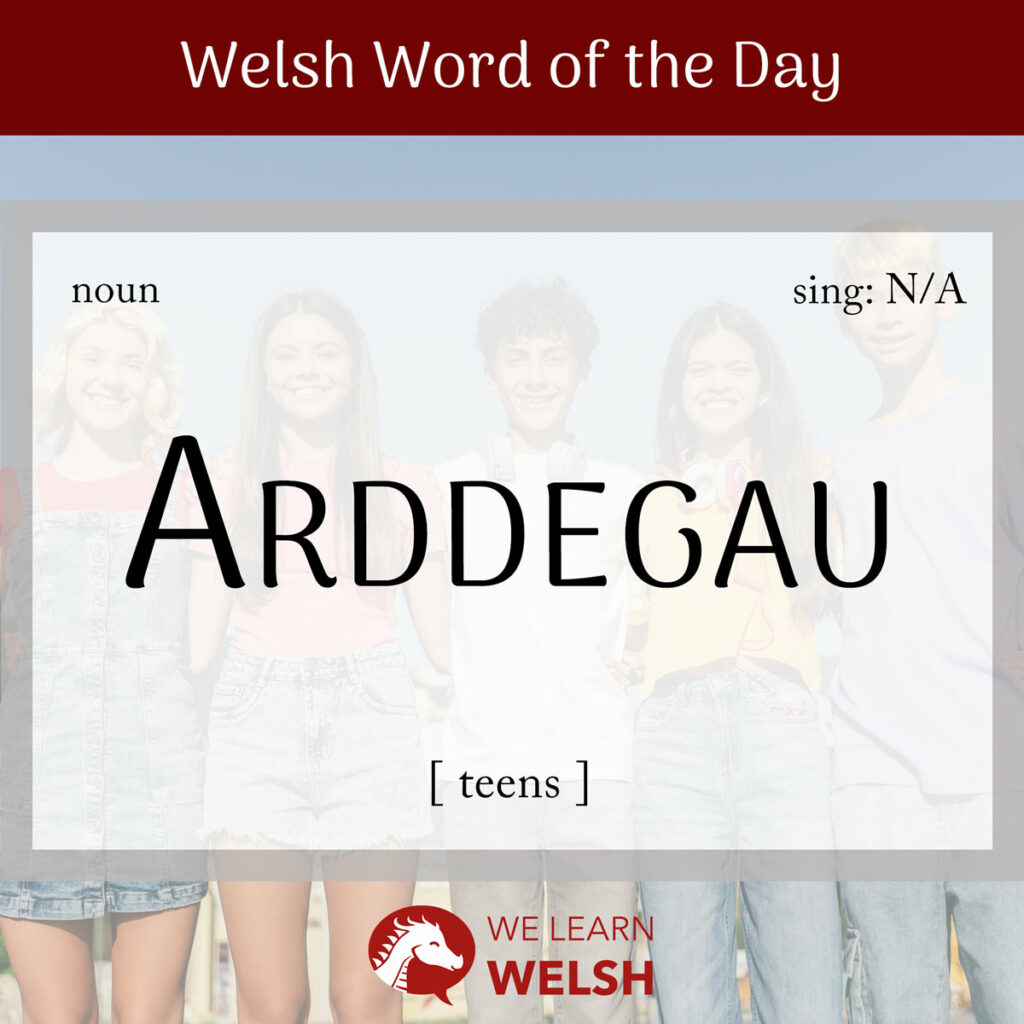Nobody’s perfect – we’ve all done things that were a bit silly or careless at one time or another. I certainly have my fair share of those regrets, and I have to admit, most of them happened when I was yn fy arddegau (in my teens).
But the blynyddoedd arddegol (teenage years) aren’t all bad. In fact, they’re often when humans are at their most creadigol (creative), delfrydgar (idealistic), and llawn egni (energetic). It’s also the time when most pobl (people) really start to figure out their hunaniaeth (identity) and how they want to live their bywyd (life).
Arddegau is basically a plural noun, but there isn’t really a useful singular form. It generally only appears in phrases like yn fy arddegau (in my teens) or yn ei arddegau (in his teens). You wouldn’t say I’m in my teen, so we don’t need a singular form of arddegau.
arddegau
teens
There is a word arddegyn which has been used in Welsh for 70-odd years, though in my experience it’s much less common. It means teenager. And there are other words for teenager, too, like glaslanc for a boy and glaslances for a girl.
My Welsh-speaking family and friends have always used the phrase yn ei arddegau or equivalents, rather than going for a noun form of teenager. I think it’s quite fun and unique that this is one of the default ways of talking about teenagers in Welsh, so that’s what I’ve used as the title of this article.
But this isn’t consistent across Wales – there’s a lot of variety. As I said, arddegyn (the plural is arddegion) and glaslanc (the plural is glaslanciau) are in common usage. You could also go for llanc / llencyn (youth) or just dyn ifanc / dynes ifanc (young man / young woman). A more formal term would be adolesent (adolescent).
If you do want to go for the arddegau version, you’ll have to be sure you use the right form to describe different genders and numbers of people!
- yn fy arddegau = in my teens
- yn ein harddegau = in our teens
- yn dy arddegau = in your teens (informal and singular)
- yn eich arddegau = in your teens (formal and / or plural)
- yn ei arddegau = in his teens
- yn ei harddegau = in her teens
- yn eu harddegau = in their teens
So a teenager would be either merch yn ei harddegau (a girl in her teens) or bachgen yn ei arddegau (a boy in his teens). Teenagers is plant yn eu harddegau (children in their teens). It sounds long-winded but it doesn’t feel that way if that’s what you’re used to!
If you aren’t sure what gender someone is or what pronouns they use, though, I’d say you should probably play it safe by going for the more modern arddegyn.
The other thing you might have observed about the examples above is that in three cases, I swapped out arddegau for harddegau. Don’t worry, it’s not a typo! In Welsh, words that begin with vowels are subject to a special form of mutation called h-prosthesis. This means that if they follow ein (our), eu (their), or ei (his / her) when it’s used to mean her, an h sound is added to the start of the word. Some people omit h-prosthesis when chatting casually, though.
Mae gen i frawd a chwaer yn eu harddegau – dyn ni’n dadlau drwy’r amser.
I have a brother and a sister in their teens – we fight all the time.
Arddegau is a compound word. It’s based on the word deg (ten), and ar means on. Adding the ar as a prefix causes deg to soft mutate to ddeg, and the suffix au makes the word plural. So literally arddegau means on-tens.
In Welsh, there are a couple of different counting systems, and the older one makes use of the term ar ddeg for the ‘teenage numbers,’ alongside the unique ar bymtheg (literally on fifteen). Below are the numbers thirteen to nineteen in both traditional and modern forms.
- tri ar ddeg / un deg tri (thirteen)
- pedwar ar ddeg / un deg pedwar (fourteen)
- pymtheg / un deg pump (fifteen)
- un ar bymtheg / un deg chwech (sixteen)
- dau ar bymtheg / un deg saith (seventeen)
- deunaw / un deg wyth (eighteen)
- pedwar ar bymtheg / un deg naw (nineteen)
The concept of being yn eich arddegau (in one’s teens) is actually very recent in terms of human history. In most societies going back, plant (children) who had reached llencyndod / glasoed (adolescence) were just considered young oedolion (adults).
They’d likely be expected to gweithio (work), priodi (marry) and assume a lot of responsibility at a much younger age than is common in countries like Britain today. In fact, in many non-English languages, there is still no word for teenager at all.
You could say that oedolion ifanc (young adults) like me are very lucky these days. Parental support tends to last much longer than at any other period in hanes (history), and it’s common to still be in addysg (education) and / or to live with one’s rhieni (parents) right up until one’s late twenties and even early thirties! But the flip side is that for my cenhedlaeth (generation), relative wages are lower and goals like buying a house can be much less accessible than they were for our rhieni. Swings and roundabouts…
Mae ‘na fachgen yn ei arddegau ‘ma, draw wrth y drws.
There’s a teenage boy here, over by the door.
The word arddegau, like the English word teenager, refers fairly strictly to the period of being between tri ar ddeg and pedwar ar bymtheg.
But the concept of adolescence is a lot more fluid. It tends to be measured by life goals like going to ysgol uwchradd (high school) and then coleg (college) or prifysgol (university), learning to gyrru (drive), getting a swydd (job), and beginning to explore independent perthnasau (relationships), including the romantic kind.
It also overlaps with the biological process of blaenaeddfedrwydd (puberty), which involves tyfu (growing), undergoing various bodily changes, and often becoming very moody!
Of course, your experience of being yn eich arddegau depends heavily on where your rheini have chosen to bring you up. I grew up in rural mid-Wales, which had a lot of upsides and a lot of downsides! Learning Cymraeg from an early age and continuing to be able to use it yn fy arddegau isn’t something I’d change for the world, and neither is the beautiful landscape.
But in a rural and fairly poor area, there’s often less funding for ysgolion (schools), and less opportunities to get a swydd ran-amser (part-time job). There’s also not a lot to do for pobl ifanc – except of course the Clwb Ffermwyr Ifanc (Young Farmers’ Club)!


